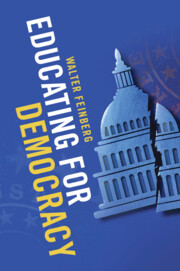Refine search
Actions for selected content:
30 results
Chapter 5 - Praxis Epistemology II
-
- Book:
- Vico and the Maker's Knowledge Tradition
- Published online:
- 27 June 2025
- Print publication:
- 17 July 2025, pp 149-184
-
- Chapter
- Export citation
Introduction
-
- Book:
- Guru Nanak's Transcendent Aesthetics
- Published online:
- 21 November 2024
- Print publication:
- 21 November 2024, pp 1-27
-
- Chapter
- Export citation
14 - Norms, Normativity, and Pragmatist Justification
- from Part IV - Dimensions of Norm Contestation
-
-
- Book:
- Contesting the World
- Published online:
- 01 November 2024
- Print publication:
- 06 June 2024, pp 236-251
-
- Chapter
- Export citation
4 - Learning, Democracy and the Realist Critique
- from Part I
-
- Book:
- On Global Learning
- Published online:
- 07 September 2023
- Print publication:
- 21 September 2023, pp 103-127
-
- Chapter
- Export citation
5 - Pragmatic Constructivism and the Challenge of Global Governance
- from Part I
-
- Book:
- On Global Learning
- Published online:
- 07 September 2023
- Print publication:
- 21 September 2023, pp 128-154
-
- Chapter
- Export citation
3 - Habit, Habitus and Conscientious Reflection
- from Part I
-
- Book:
- On Global Learning
- Published online:
- 07 September 2023
- Print publication:
- 21 September 2023, pp 74-102
-
- Chapter
- Export citation
2 - Norms and Practice
- from Part I
-
- Book:
- On Global Learning
- Published online:
- 07 September 2023
- Print publication:
- 21 September 2023, pp 39-73
-
- Chapter
- Export citation
6 - Between Abandon and Inquiry
- from Part II - Re-orienting Critique in Organization Studies? Exploring Jointly Time and Politics
-
-
- Book:
- Organization as Time
- Published online:
- 22 June 2023
- Print publication:
- 06 July 2023, pp 116-135
-
- Chapter
- Export citation
17 - Global Justice and Democratic Education
- from Part Three - Key Topics and Concepts
-
-
- Book:
- The Cambridge Handbook of Democratic Education
- Published online:
- 20 April 2023
- Print publication:
- 27 April 2023, pp 281-297
-
- Chapter
- Export citation
Introduction
-
- Book:
- Educating for Democracy
- Published online:
- 20 April 2023
- Print publication:
- 27 April 2023, pp 1-12
-
- Chapter
- Export citation
5 - Dewey on Democratic Education
- from Part One - Historical Perspectives
-
-
- Book:
- The Cambridge Handbook of Democratic Education
- Published online:
- 20 April 2023
- Print publication:
- 27 April 2023, pp 61-73
-
- Chapter
- Export citation

Educating for Democracy
-
- Published online:
- 20 April 2023
- Print publication:
- 27 April 2023
6 - Coherence as Reflexivity
-
- Book:
- Manifestations of Coherence and Investor-State Arbitration
- Published online:
- 13 December 2022
- Print publication:
- 19 January 2023, pp 207-251
-
- Chapter
- Export citation
14 - American Functionalism
- from Part II - Systems of Psychology
-
- Book:
- History and Systems of Psychology
- Published online:
- 04 November 2022
- Print publication:
- 17 November 2022, pp 267-300
-
- Chapter
- Export citation
3 - Rorty and Classical Pragmatism
-
-
- Book:
- The Cambridge Companion to Rorty
- Published online:
- 13 April 2021
- Print publication:
- 01 April 2021, pp 67-87
-
- Chapter
- Export citation
17 - Habits and the Enculturated Mind
- from Part III - Socially Embeddded and Culturally Extended Habits
-
-
- Book:
- Habits
- Published online:
- 24 November 2020
- Print publication:
- 03 December 2020, pp 352-375
-
- Chapter
- Export citation
16 - Habit and the Human Lifespan
- from Part III - Socially Embeddded and Culturally Extended Habits
-
-
- Book:
- Habits
- Published online:
- 24 November 2020
- Print publication:
- 03 December 2020, pp 337-351
-
- Chapter
- Export citation
13 - Habits of Goodness
- from Part II - The Enactment of Habits in Mind and World
-
-
- Book:
- Habits
- Published online:
- 24 November 2020
- Print publication:
- 03 December 2020, pp 277-294
-
- Chapter
- Export citation
10 - Habits, Meaning, and Intentionality
- from Part II - The Enactment of Habits in Mind and World
-
-
- Book:
- Habits
- Published online:
- 24 November 2020
- Print publication:
- 03 December 2020, pp 223-244
-
- Chapter
- Export citation
Hegel est-il «pragmatiste»? Quelques remarques critiques à propos d'un problème mal posé
-
- Journal:
- Dialogue: Canadian Philosophical Review / Revue canadienne de philosophie / Volume 59 / Issue 2 / June 2020
- Published online by Cambridge University Press:
- 28 August 2020, pp. 271-303
-
- Article
-
- You have access
- HTML
- Export citation
